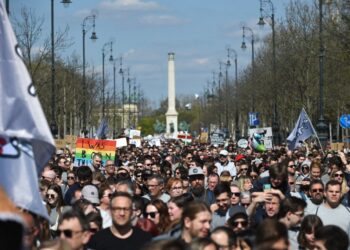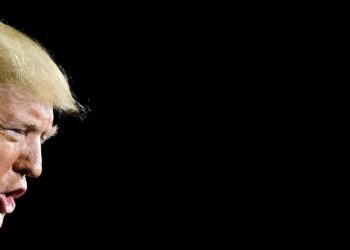Amid escalating diplomatic fury between Turkey and the Netherlands, leaders are putting aside diplomatic etiquette. Even German Chancellor Angela Merkel, who is the closest European leader to the Turkish president, got her share.
“Shame on you,” Turkey’s President Recep Tayyip Erdogan exploded in fury after Mrs. Merkel’s support for the Netherlands over the Turkish-Dutch diplomatic spat. Mr. Erdogan leveled his harshest blow against the German chancellor to date, a remarkable departure from close ties between the two allies. Mr. Merkel was in Turkey only a month ago.
Mrs. Merkel underlined that the Turkish president’s depiction of the Netherlands as “Nazi remnants” was misplaced and misguided.
Turkey’s relations with the Netherlands relapsed into a state of bitter dispute after the Dutch government did not allow Turkish ministers to hold political rallies in Rotterdam. The row unraveled into tit-for-tat recriminations and mutual accusations.
When Foreign Minister Mevlut Cavusoglu did not get a permit for landing in Rotterdam, tensions were escalated into an unprecedented level. Another Turkish minister, who was in Germany when the whole spat broke out, forced her way into Rotterdam, only to be escorted by the Dutch police back to the German border after being declared as persona non grata.
Whether both sides would have avoided that disconcerting incident remains an open question, but the Dutch side ascribed blame on the Turkish officials for the eruption of mayhem and chaos.
Rotterdam Mayor Ahmed Aboutaleb, a Muslim politician of Moroccan origin, did not hide his disdain after being deceived by the Turkish council general whom he says misled the Dutch officials by outrightly lying that the family minister would not descend on Rotterdam after warnings.
“He lied to us and didn’t tell the truth,” the mayor said. “The deception worsened when they drove in different columns to Rotterdam,” to try to fool Dutch authorities, the Associated Press quoted the mayor.
“She is like my daughter,” President Erdogan told AHaber, a pro-government news channel, referring to Turkey’s Family Minister Fatma Betul Sayan. Mrs. Sayan’s confrontation with Dutch police officers, whom Mr. Erdogan described as “two gorillas”, enraged Turks in the Netherlands and Turkey, reinforcing debates about how the Netherlands is treating Muslims.
That episode set off a diplomatic firestorm, prompting the Turkish government to place retaliations against Amsterdam, halting all high-level political relations, including the closing of the Turkish airspace to Dutch diplomats. The Turkish Foreign Ministry said the Dutch ambassador to Ankara who is on leave is not welcome back in Turkey and should not return for a while. Deputy Prime Minister Numan Kurtulmus called on the Turkish lawmakers to withdraw from Dutch-Turkish Parliamentary Friendship Group.
President Erdogan repeated his Nazi charges, this time against the Dutch government, eliciting a harsh rebuke from the Netherlands, which is braced a critical election on Wednesday.
Dutch Prime Minister Mark Rutte described Mr. Erdogan’s Nazi remarks are “way out of line.”
“It’s a crazy remark of course,” Rutte told a group of journalists during a campaign event for the March 15 election. “I understand they’re angry, but this of course way out of line,” Reuters quoted him as saying. He also refused to meet the Turkish demand for an official apology.
On Monday, Mr. Erdogan said Mr. Rutte was yet to grasp what democracy is.
As the row escalated, the European Commission, the executive branch of the European Union, has called on both sides for calm and urged Ankara to tone down its inflammatory rhetoric.
When Mrs. Merkel said the Turkish president’s remarks against the Netherlands were unacceptable, the Mr. Erdogan fumed in indignation, extended his tirades against the German chancellor.
“Germany completely rejects rhetorical and any other comparisons with the National Socialists made by the Turkish president,” Merkel who already spoke against a previous Nazi comparison leveled against her government in the latest spat with Turkey.
“This rejection is also valid for our allies such as the Netherlands. These comparisons are completely misguided. They trivialize the suffering, Particularly in the Netherlands that endured so much agony through the National Socialists, it’s just completely unacceptable. That’s why the Netherlands can count on my complete support and solidarity on this,” Reuters quoted the German chancellor as saying.
That was enough for Mr. Erdogan to unload his fury against Mrs. Merkel whom he accused of abetting terrorism.
Mr. Erdogan said on Monday that Merkel’s Germany is hosting thousands of terrorists, and refusing to meet Turkish request to hand them over.
“Some of the European Union countries — let’s not put all of them n the same sack — unfortunately cannot stomach Turkey’s rise,” he said. “Sadly, Germany tops the list. Germany supports terror in a cruel way,” the Associated Press quoted Mr. Erdogan as saying.
Given the long history of the friendly relationship dating back to early 1600s, the highly-charged tense drama that defines current relations appears unprecedented. But for many observers, the umbrage voiced by both sides is meant for domestic consumption.
Mr. Rutte who seeks to curb the rise of the Geert Wilders’ Party for Freedom (PVV) did not want to appear weak against the Turkish government only days before the election. And the whole episode was a great boon for the Turkish side ahead of a controversial referendum on new constitution.
Early polls suggest a tight race between Yes and No votes amid genuine fears among wide segments of society that the referendum would usher in a dictatorship, giving vast executive powers to Mr. Erdogan.
A pro-Erdogan commentator said on A Haber TV that Ankara should even thank the Dutch government for escalation of the crisis. The dispute contributed to increase 2 percent in Yes votes, he stated.
********
This article was possible thanks to your donations. Please keep supporting us here.





















